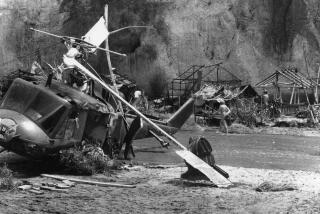Behind the Sharon Verdict
- Share via
Ariel Sharon, former defense minister of Israel, lost his his $50-million libel suit against Time Inc. It would be legally correct to say that the magazine won, but in a larger sense Time also lost.
Sharon charged that Time falsely accused him of knowingly permitting or encouraging the massacre of more than 700 Palestine refugees by Lebanese Christians in West Beirut camps in September, 1982. The massacre followed the assassination of Lebanese leader Bashir Gemayel.
The six-member jury, after hearing and reviewing mountains of evidence in a two-month-long trial, agreed with Shron’s complaint and decided that a crucial paragraph in the Time article defamed Sharon and was false, but the jury also found that the magazine acted without malice, and this verdict cost Sharon his overall case and deprived him of any chance to collect damages.
The jury found that no member of the Time staff intentionally reported false information, but the verdict was hardly an endorsement of the magazine’s reporting and editing procedures. Coupled with the verdict was an unusual amplifying statement that the court permitted the jury foreman to read. “We find,” the statement said, “that certain Time employees . . . acted negligently and carelessly in reporting and verifying the information which ultimately found its way into the published paragraph of interest in this case.”
But that was not enough to win the case for Sharon. U.S. libel law, since the 1964 Sullivan decision of the Supreme Court, requires a public figure to show not only that a published statement is defamatory and false but also that it is published with the knowledge of its falsity or with a reckless disregard for the truth. Time, the jury concluded, did not libel Sharon, because the magazine had no “serious doubts as to the truth” of its report.
The verdict was scarcely a famous victory for Time, which, without firm evidence, published information that could be read as accusing Sharon of instigating mass murder. In fact, the jury found that the disputed paragraph implied that Sharon had “consciously intended” Israel’s Falangist allies to carry out the atrocity. So serious an assertion should have been supported by more than ambiguous reporting.
One observer saw the verdict as affirming “the fundamental value of the American system of news reporting as protected by the First Amendment--including an occasional good-faith error by even the most responsible news organizations. It demonstrates how critical it is to preserve the free expression of political ideas by giving the media the breathing space they need to effectively inform the public about controversial issues and public figures.”
That is true. The press needs “breathing space” to fulfill its function, but the Sharon case certainly raises troublesome questions for journalism in general. Is journalism sufficiently hospitable to outside criticism of its performance? Does it provide its critics with an adequate forum for their complaints? Is it sufficiently self-critical?
American law, as demonstrated by the Sharon suit, provides the media with a large measure of protection. That protection, we believe, is necessary, but with it goes a corresponding responsibility to maintain standards of fairness and excellence.
More to Read
Inside the business of entertainment
The Wide Shot brings you news, analysis and insights on everything from streaming wars to production — and what it all means for the future.
You may occasionally receive promotional content from the Los Angeles Times.










